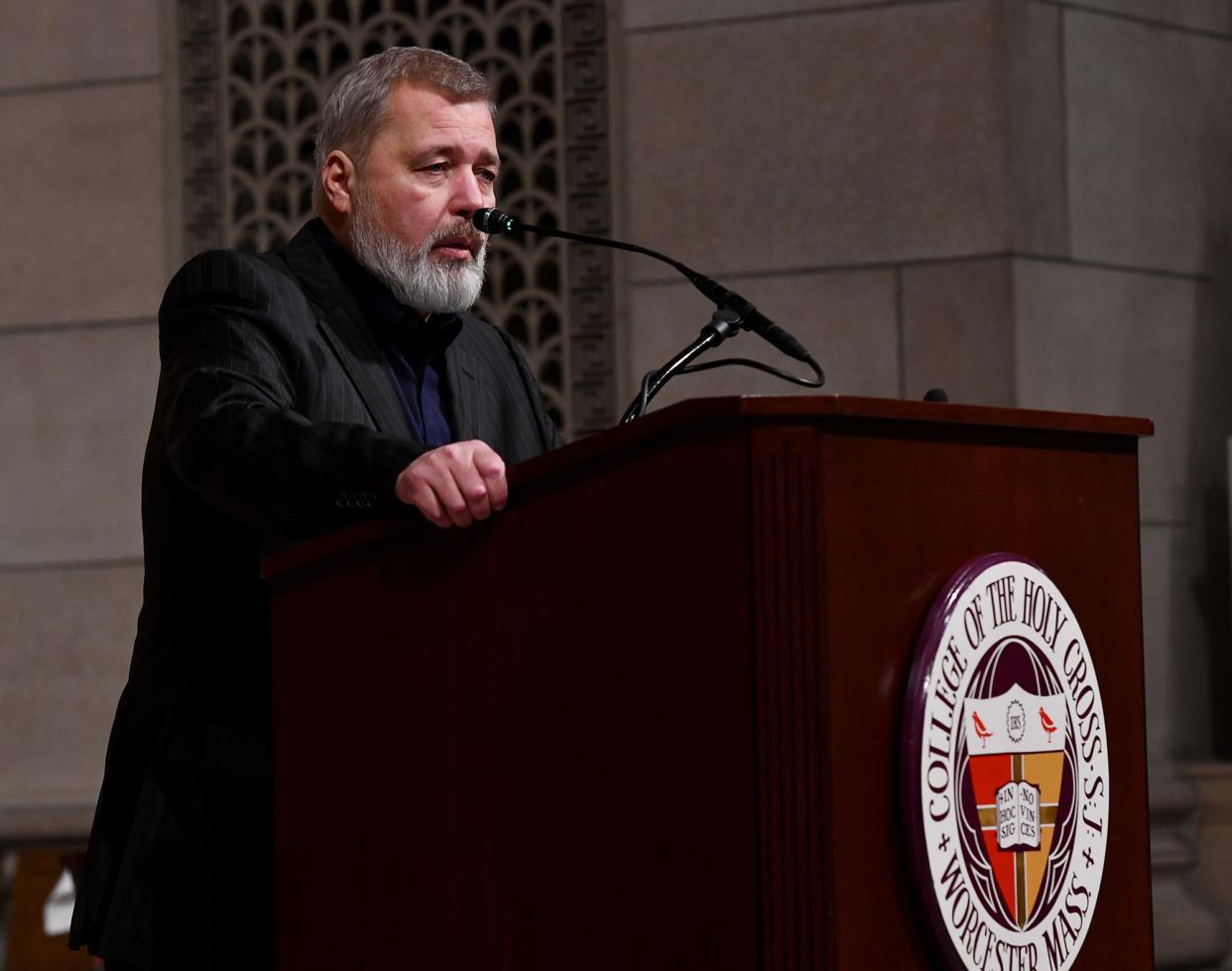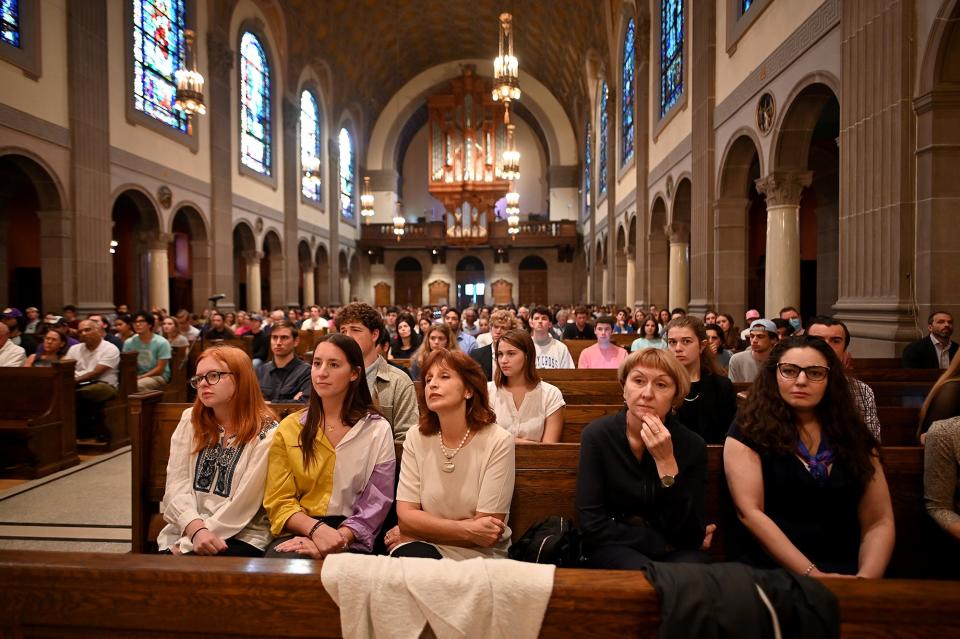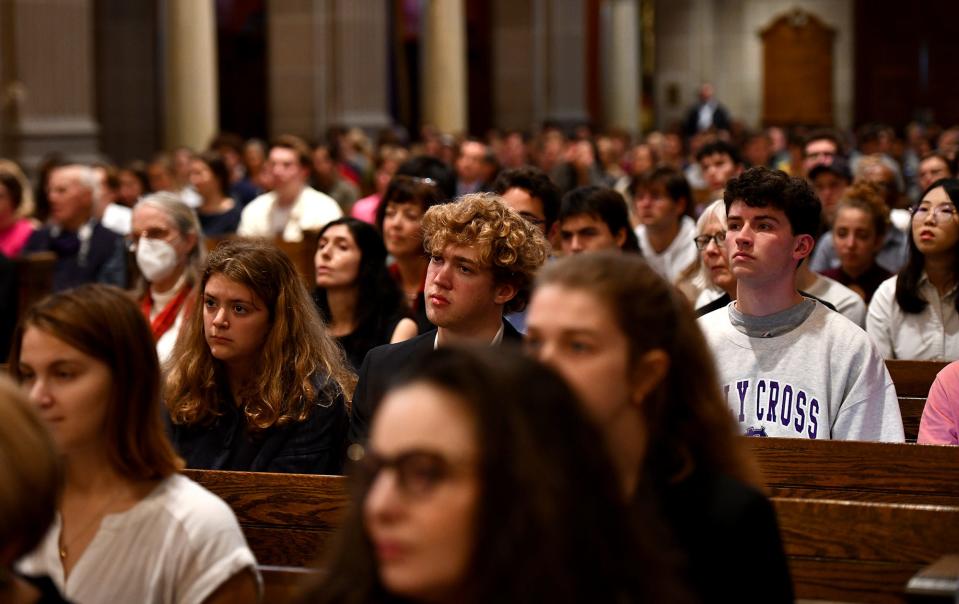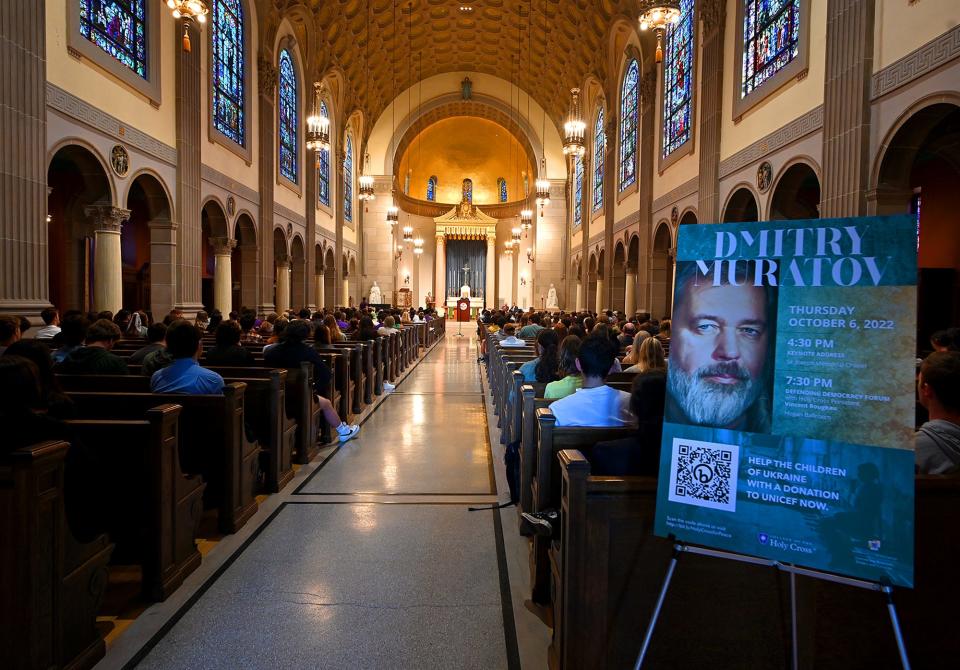Nobel Prize-winning Russian journalist speaks on Ukraine, nuclear tensions at Holy Cross

- Oops!Something went wrong.Please try again later.
- Oops!Something went wrong.Please try again later.
- Oops!Something went wrong.Please try again later.
WORCESTER — Nobel Prize-winning Russian journalist Dmitry Muratov called for an antiwar movement to emerge in response to the increasing nuclear tensions in Ukraine during a talk he gave Thursday at the College of the Holy Cross.
The 59-year-old, who was awarded and shared the Nobel Peace Prize with Filipino journalist Maria Ressa in 2021 “for their efforts to safeguard freedom of expression," spoke through a Russian-language interpreter to a near-capacity audience of mostly college students at 900-seat St. Joseph Memorial Chapel.
“Everything is in your hands,” said Muratov, referring to the students. “A young antiwar movement should appear — nonpolitical, (without) social, religious differences.”
Muratov is one of the founders and editor-in-chief of Novaya Gazeta, a Russian-language newspaper known for its investigative coverage that has been repeatedly critical of the Russian government since 1993.

The murders of six Novaya journalists since 2000 are widely believed to have been motivated by the persistent investigative work of the publication.
In March, Novaya suspended its work and in September its media license was removed by Russian authorities. A print edition of Novaya is now published in Latvia.
At Thursday’s talk, Muratov chose not to focus on freedom of speech talks by his own admittance and instead focused on the Russian military campaign in Ukraine.
He stressed the alarming danger from nuclear war and the use of propaganda by the Russian government to justify use of nuclear weapons.
"Propagandists are preparing people to think that nuclear war is OK," said Muratov. "(Vladimir Putin) was too young to participate in the Second World War, but still wants to gain a victory in the Second World War.
"Putin lives in the past."
Attacked with red paint in Russia
In April, Muratov was attacked with red paint while on a train from Moscow one month after promising to auction off his Nobel Prize medal to raise funds for refugees escaping the war in Ukraine.
In June, an auction on the medal raised $103.5 million, all which Muratov said would go "for the Ukrainian children.”

Along with the auctioning price, Muratov also donated the $500,000 cash award that comes along with the Nobel Prize.
On Thursday, Muratov cited Mikhail Gorbachev, the general secretary of the Communist Party of the Soviet Union, who was awarded the 1989 Nobel Peace Prize after he took steps to disintegrate the Soviet Union.
Muratov echoed Gorbachev’s calls for protection of human life when facing nuclear war.
“His main goal was the betterment of humanity,” said Muratov. “For Gorbachev it was important.”
Muratov reminisced about a close moment with Gorbachev, with whom he said to be close friends, in which he would read in private the speech he had planned to read before the U.N.
“He turned the page and there was written ‘Ban wars,’ ” said Muratov. “I said, ‘Is that all?’ He said, ‘What else do you want?’ "
Gorbachev died Aug. 30 at 91 in Moscow.
Summit between Gorbachev, Reagan
In the echoing chapel at Holy Cross, Muratov also recounted historical events such as the Reykjavík Summit of 1986, during which Gorbachev and U.S. President Ronald Reagan met to discuss human rights and arms control among other issues.
He stressed that although resulting in a deadlock, the seven-minute meeting gave way to reforms that emphasized the risks of nuclear weapon use.

In later years, the two countries signed the Intermediate-Range Nuclear Forces Treaty to ban both nations’ land-based ballistic missiles and cruise missiles, which resulted in the elimination of 2,692 missiles.
Muratov also recounted the 1983 incident in which Soviet Officer Stanislav Petrov went against military orders to launch a missile attack against U.S. forces.
“There is no more Reagan, Gorbachev or Petrov,” said Muratov. “It's now our task."
The Russian Federation is reported to have 5,977 nuclear warheads at its disposition, which Putin and other officials have threatened to use after the annexation of four areas in Ukraine which they now recognize as Russian territory.
Also on Thursday, President Joe Biden said that Putin’s threats for nuclear weapon use are at the highest level since the Cold War.
This article originally appeared on Telegram & Gazette: Dmitry Muratov speaks in Worcester at College of Holy Cross

